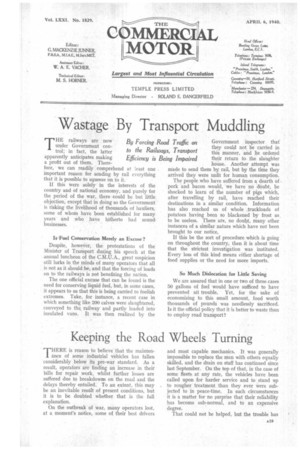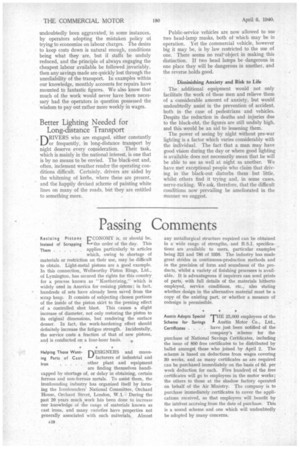Keeping the Road Wheels Turning
Page 21

Page 22

If you've noticed an error in this article please click here to report it so we can fix it.
T'THERE is reason to believe that the maintenance of some industrial vehicles has fallen considerably below its pre-war standard. As a result, operators are finding an increase in their bills for repair work, whilst further losses are suffered due to breakdowns on the road and the delays thereby entailed. To an extent, this may be an inevitable result of present conditions, but it is to be doubted whether that is the full explanation.
On the outbreak of war, many operators lost, at a moment's notice, some of their best drivers and most capable mechanics. It was generally impossible to replace the men with others equally skilled, and the drain on staff has continued since last September. On the top of that, in the case of some fleets at any rate, the vehicles have been called upon for harder service and to stand up to rougher treatment than they ever were subjected to in peace-time. In such circumstances it is a matter for no surprise that their reliability has become sub-normal, and to an expensive degree.
That could not be helped, but the trouble has Als undoubtedly been aggravated, in some instances, by operators adopting the mistaken policy of trying to economize on labour charges. The desire to keep costs down is natural enough, conditions being what they are, but if staffs be unduly reduced, and the principle of always engaging the cheapest labour available be followed invariably, then any savings made are quickly lost through the unreliability of the transport. In examples within our knowledge, monthly accounts for repairs have mounted to fantastic figures. We also know that much of the work would never have been necessary had the operators in question possessed the wisdom to pay out rather more weekly in wages.
Better Lighting Needed for Long-distance Transport
DRIVERS who are engaged. either constantly or frequently, in long-distance transport by night deserve every consideration. Their task, which is mainly in the national interest, is one that is by no means to be envied. The black-out and, often, inclement weather render the operating conditions difficult. Certainly, drivers are aided by the whitening of kerbs, where these are present, and the happily devised scheme of painting white lines on many of the roads, lynt they are entitled to something more. Public-service vehicles are now allowed to use two head-lamp masks, both of which may be in operation. Yet the commercial vehicle, however big it may be, is by law restricted to the use of one. There seems no real'object in making this distinction. If two head lamps be dangerous in one place they will be dangerous in another, and the reverse holds good.
Diminishing Anxiety and Risk to Life The additional equipment would not only facilitate the work of these men and relieve them of a considerable amount of anxiety, but would undoubtedly assist in the prevention of accident, both in the case of pedestrians and vehicles. Despite the reduction in deaths and injuries due to the black-otit, the figures are still unduly high, and this would be an aid to lessening them.
The power of seeing by night without pre-war lighting is a factor which varies considerably with the individual. The fact that a man may have good vision during the day or where good lighting is available does not necessarily mean that he will be able to see as well •at night as another. We have met exceptional people who claim that driving in the black-out disturbs them but little, whilst others find it trying and, in some cases, nerve-racking. We ask, therefore, that the difficult conditions now prevailing be ameliorated in the manner we suggest.




























































